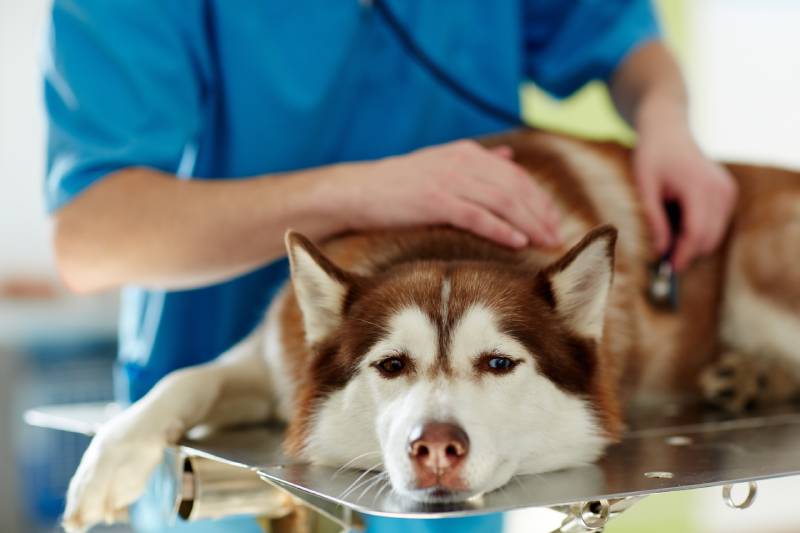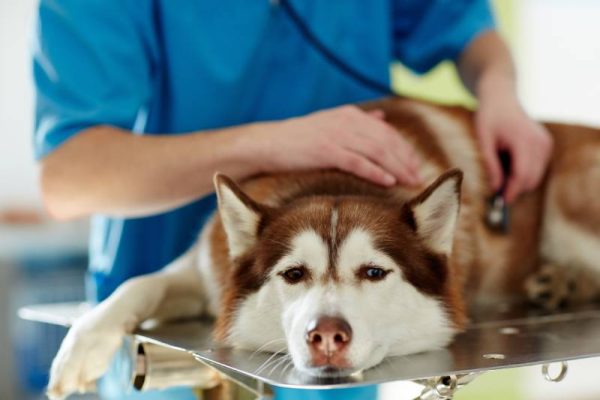Click to Skip Ahead
How concerned should we be about dehydration in dogs? Can it cause neurological issues such as seizures? Thankfully, dehydration is an uncommon cause of seizures in dogs. The main situation in which vets observe dehydration and seizures together is heat stroke. However, in episodes of heat stroke, there are other severe internal or metabolic derangements that may be causing the seizures.
Seizures are caused by rapid and abnormal electrical firing in the brain, resulting in what is colloquially referred to as a “fit”. While epilepsy is one of the more common causes of seizures in dogs, there is a long list of other things that can trigger seizures.

Dehydration and Seizures in Dogs
Dehydration alone is a rare cause of seizures in dogs. Most vets would agree that if a dog is eating and drinking less, and becomes dehydrated, this is very unlikely to cause seizures. In theory, the elevated sodium levels that occur due to dehydration can cause changes in the brain that lead to seizures. In practice, however, dogs must be extremely dehydrated for this to occur, and most people have intervened or sought veterinary attention before the situation gets this bad.
One instance where dehydration and seizures occur together is heat stress or heatstroke. However, dogs suffering heatstroke also have a very high body temperature (hyperthermia) and can suffer organ failure; this is more likely to cause seizures than dehydration.

My Dog Isn’t Drinking – Should I Be Worried About Seizures?
If your dog is drinking less than usual, you should seek veterinary attention. Reduced thirst is a sign of a number of diseases, including pain or discomfort, gastroenteritis, kidney disease, and many more. Reduced thirst is not characteristic of any one problem. However, you don’t need to be too concerned about dehydration causing your dog to have a seizure unless your dog is known to have a prior seizure disorder.
If your dog has had seizures before, due to a condition such as epilepsy, it’s worth being more alert to changes in their thirst and appetite. Any other diseases, stresses, or changes can lower the “seizure threshold,” leading to the recurrence of seizures.
Seek veterinary advice if you’re concerned about your pet’s well-being.
PangoVet. It’s an online service where you can <b>talk to a vet online</b> and get the personalized advice you need for your pet — all at an affordable price!
</p>
<div class="su-button-center"><a href=https://www.dogster.com/ask-the-vet/"https://pangovet.com/?utm_source=dogster&utm_medium=article&utm_campaign=dog_preventative_wellness%22 class="su-button su-button-style-default" style="color:#FFFFFF;background-color:#FF6600;border-color:#cc5200;border-radius:9px;-moz-border-radius:9px;-webkit-border-radius:9px" target="_blank" rel="nofollow"><span style="color:#FFFFFF;padding:0px 24px;font-size:18px;line-height:36px;border-color:#ff944d;border-radius:9px;-moz-border-radius:9px;-webkit-border-radius:9px;text-shadow:none;-moz-text-shadow:none;-webkit-text-shadow:none"> Click to Speak With a Vet</span></a></div></div></div>"}" data-sheets-userformat="{"2":513,"3":{"1":0},"12":0}"> If you need to speak with a vet but can’t get to one, head over to PangoVet. It’s an online service where you can talk to a vet online and get the personalized advice you need for your pet — all at an affordable price!

What Are the Signs of Dehydration in Dogs?
- Reduced thirst
- Reduced appetite
- Sunken eyes
- Dry gums
- Panting
- Weakness/lethargy

What Are the Signs of Seizures in Dogs?
Most people will know a generalized or grand mal seizure when they see one. However, partial seizures or petit mal seizures can also occur, and these can be less obvious.
- Wobbliness
- Collapse
- Stiffness
- Muscle spasm
- Unresponsiveness
- Foaming at the mouth
- Loss of bladder/bowel control

What Triggers Seizures in Dogs?
There are numerous causes of seizures in dogs. One of the most common causes of seizures in dogs is epilepsy, also known as idiopathic epilepsy. The word “idiopathic” means that no cause has been identified. This is a congenital or hereditary seizure disorder that generally starts at a young age. Another relatively common cause of seizures is toxins; in other words, dogs eating something they shouldn’t. Chocolate, artificial sweeteners, snail bait, illicit drugs, and antifreeze can all cause seizures in dogs.
Finally, auto-immune diseases, infections, and tumors that affect the brain can lead to seizures.

How Can I Get My Dog to Drink More?
As we mentioned, if your dog is not drinking, it’s always worth getting him or her checked by a veterinarian. A thorough physical examination and some basic diagnostic tests may explain why your dog’s thirst is reduced. If you do want your dog to drink more, consider these options:
- Ensure water is fresh and clean
- Add ice cubes to their water
- Add water to their food
- Praise them and offer treats when they drink
- Place an additional water bowl in the house
- Ensure they are getting sufficient exercise
Conclusion
There are many causes of both dehydration and seizures in dogs. In the vast majority of cases, dehydration will not cause seizures. However, extreme dehydration resulting in electrolyte imbalances or severe heat stroke with organ failure are two examples of dehydration and seizures occurring together.
When dogs are well, they will drink when they are thirsty. Many dogs that are unwell will drink less as a result of their malaise. If your dog is drinking less, eating less, or has displayed signs that resemble a seizure, do not hesitate to contact your veterinarian.
Featured Image Credit: Pressmaster, Shutterstock











